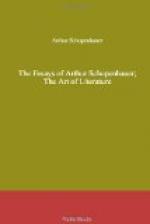ON THE STUDY OF LATIN.
The abolition of Latin as the universal language of learned men, together with the rise of that provincialism which attaches to national literatures, has been a real misfortune for the cause of knowledge in Europe. For it was chiefly through the medium of the Latin language that a learned public existed in Europe at all—a public to which every book as it came out directly appealed. The number of minds in the whole of Europe that are capable of thinking and judging is small, as it is; but when the audience is broken up and severed by differences of language, the good these minds can do is very much weakened. This is a great disadvantage; but a second and worse one will follow, namely, that the ancient languages will cease to be taught at all. The neglect of them is rapidly gaining ground both in France and Germany.
If it should really come to this, then farewell, humanity! farewell, noble taste and high thinking! The age of barbarism will return, in spite of railways, telegraphs and balloons. We shall thus in the end lose one more advantage possessed by all our ancestors. For Latin is not only a key to the knowledge of Roman antiquity; its also directly opens up to us the Middle Age in every country in Europe, and modern times as well, down to about the year 1750. Erigena, for example, in the ninth century, John of Salisbury in the twelfth, Raimond Lully in the thirteenth, with a hundred others, speak straight to us in the very language that they naturally adopted in thinking of learned matters.
They thus come quite close to us even at this distance of time: we are in direct contact with them, and really come to know them. How would it have been if every one of them spoke in the language that was peculiar to his time and country? We should not understand even the half of what they said. A real intellectual contact with them would be impossible. We should see them like shadows on the farthest horizon, or, may be, through the translator’s telescope.
It was with an eye to the advantage of writing in Latin that Bacon, as he himself expressly states, proceeded to translate his Essays into that language, under the title Sermones fideles; at which work Hobbes assisted him.[1]
[Footnote 1: Cf. Thomae Hobbes vita: Carolopoli apud Eleutherium Anglicum, 1681, p. 22.]
Here let me observe, by way of parenthesis, that when patriotism tries to urge its claims in the domain of knowledge, it commits an offence which should not be tolerated. For in those purely human questions which interest all men alike, where truth, insight, beauty, should be of sole account, what can be more impertinent than to let preference for the nation to which a man’s precious self happens to belong, affect the balance of judgment, and thus supply a reason for doing violence to truth and being unjust to the great minds of a foreign country in order to make much of the smaller minds of one’s own! Still, there are writers in every nation in Europe, who afford examples of this vulgar feeling. It is this which led Yriarte to caricature them in the thirty-third of his charming Literary Fables.[1]




